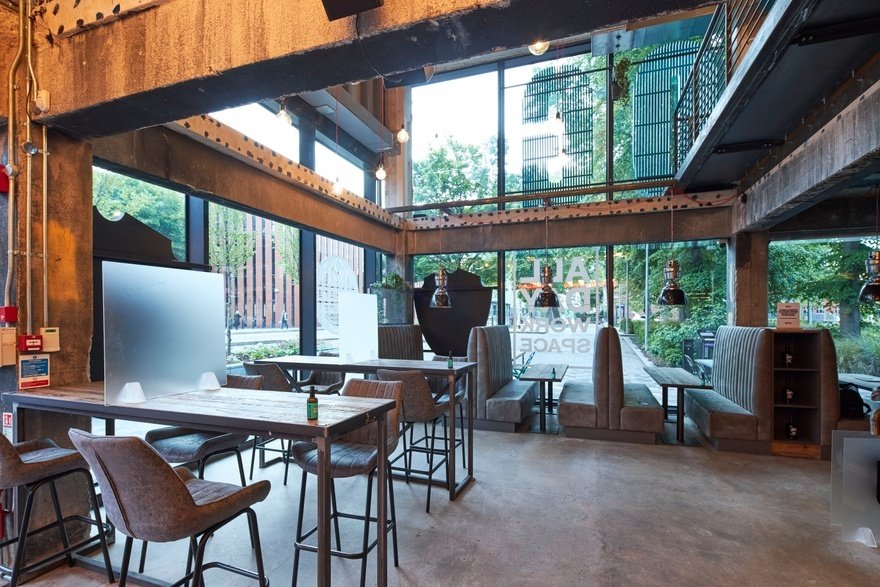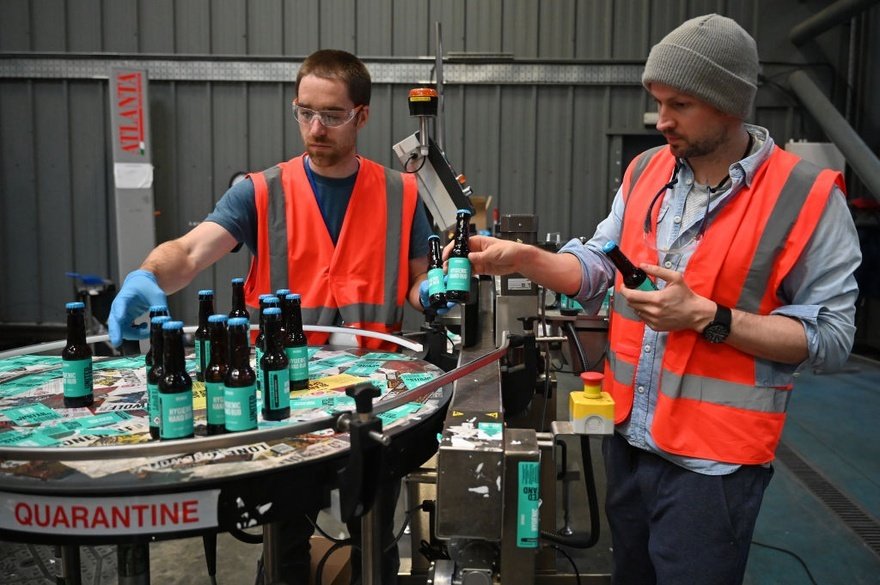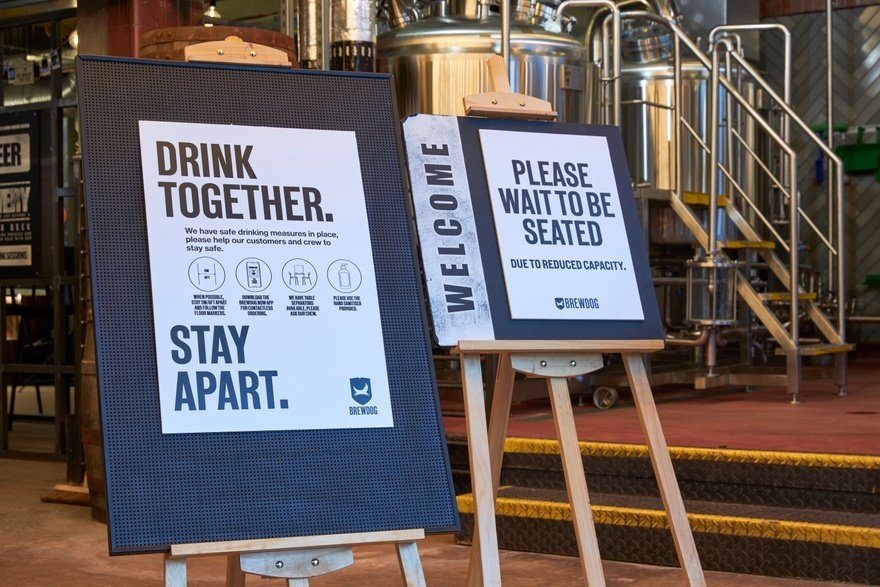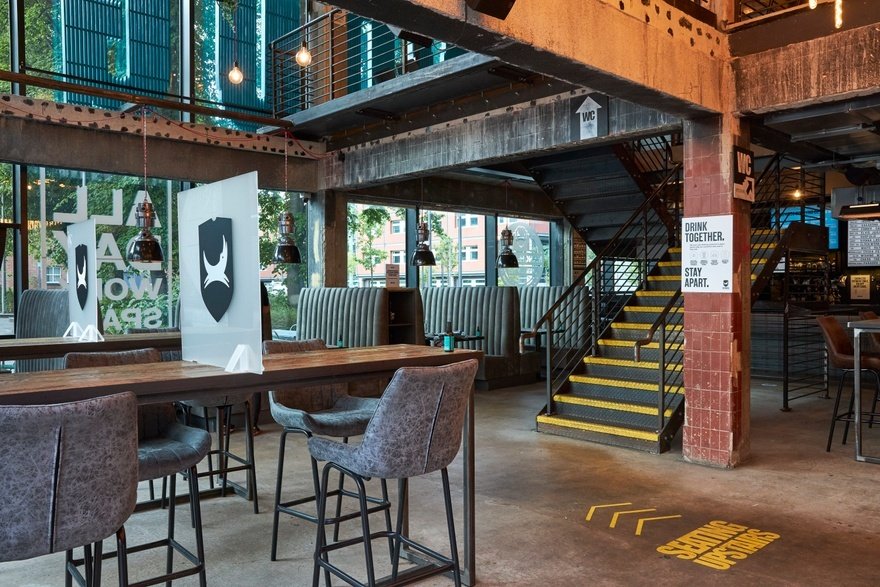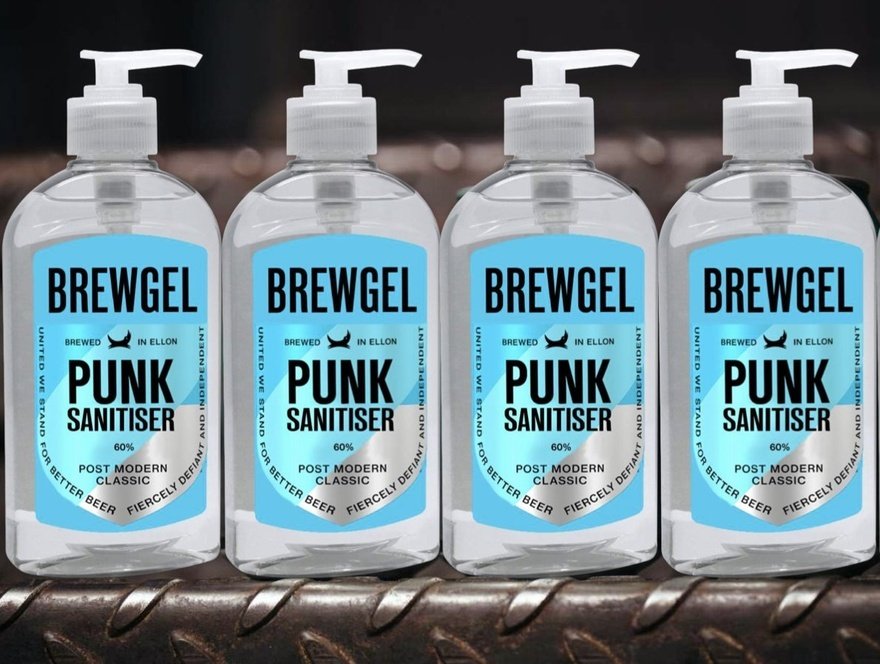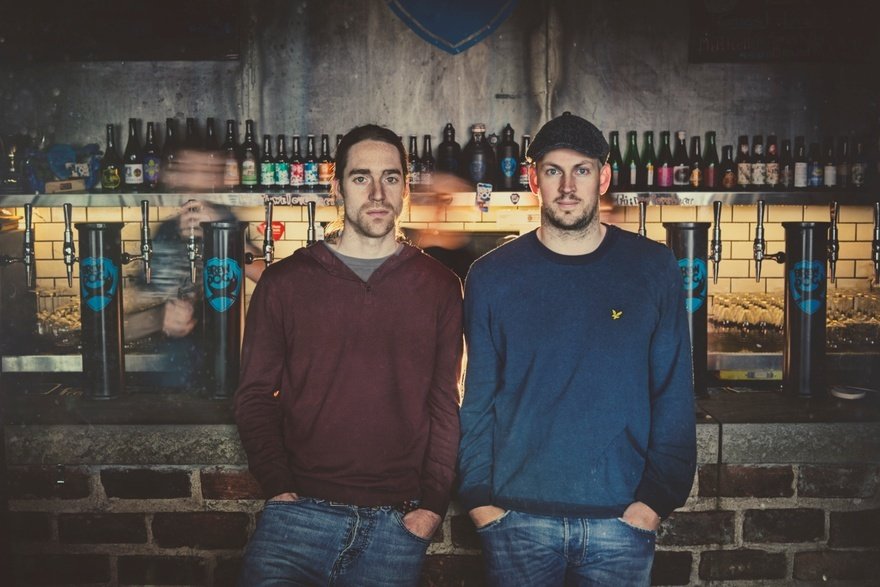BrewDog's chief operating officer David McDowall tells James Stagg that when it comes to customers returning to bars, he's hoping to build confidence rather than relying on Dutch courage.
BrewDog is a business that has never been short on confidence, be it introducing a beer mocking Dominic Cummings' drive to Barnard Castle (‘Barnard Castle Eye Test') or selling what was billed as the world's strongest beer (at 55% ABV) in a stuffed squirrel (the beer was called the End of History and priced at £500 for a 330ml bottle). But it is now looking to put all of its energy into building back the confidence of its customers to ensure that when the time is right, they are reassured enough to return.
It's an issue facing every operator. Hospitality has been – some would say unfairly – labelled as a hotbed of virus transmission; somewhere to be avoided. So when restaurants, hotels and pubs reopen, work will have to be done to rebuild the sector's reputation as a place to safely enjoy spending time. When lockdown began, supermarkets speedily pulled together advertising campaigns demonstrating their commitment to the welfare of employees and customers – now few people feel concerned about a shopping trip. It's a marketing tool that the hospitality industry should harness too, believes BrewDog chief operating officer David McDowall.
"We need to create an aggressive campaign to make sure we change the tone of the conversation from complete fear and lockdown into retail, leisure and hospitality being safe environments," he explains.
We need to create an aggressive campaign to make sure we change the tone of the conversation
"Look at how grocery shops dealt with the changes, with TV adverts detailing how the consumer experience would be very different with queues and distancing and PPE. Those pieces of visual comms really help people understand what they're going to deal with."
BrewDog already has experience of engaging an audience to encourage its return, with bars and restaurants in its 103-strong estate already open in the US, and sites across Europe now serving. To support openings in Sweden, Norway, France and Germany, the business launched a video demonstrating what a visit would be like. Through a 10-point plan, it spells out to customers that, while it will be a different experience for the foreseeable future and an altered customer journey, they are still going to a BrewDog bar and can expect a warm welcome.
"It just gets people to understand that although the customer experience will be slightly different for hopefully a short period of time, they're going into a safe and welcoming environment," McDowall says. "The sector will do some of that hard work [in the UK], but the tone of the conversation has to change.
"The reality is that licensed, highly regulated environments where you can have a beer outside are far safer in the midst of a public health crisis than just letting everyone do their own thing and drink in the park. Our teams are experts in public safety and food safety – we have to be – so we run great environments for people to enjoy drinks safely.
"Look around the country at the moment and you see people picking up beers from the supermarket and drinking in an empty pub beer garden and it baffles me when we know we can manage that as a sector much better."
Going the distance
The openings have also provided some insight for the UK business into how distancing works in operation. BrewDog in Sweden didn't close, while the business now has sites open in Norway, France and Germany, along with a Rotterdam site that opened with a franchise partner (franchises account for 15% of the business) while the majority of the estate was in lockdown. All have either one- or one-and-a-half-metre distancing.
"We've had the opportunity in a dozen or so international sites to test what that means for customers and capacity," adds McDowall. "At one metre we know that we can get to 65%-70% capacity, and at two metres we get 30%. It's a hot topic, but that's because it's a real issue. A capacity of 30% isn't viable and even 65% isn't that viable, but it's a building block – a starting point to get to where we need to be. We reckon 80%-85% of past turnover is where we stop losing money.
"So when you start at 30%, it's a long road to get there, but at 70% we could maybe do it. If I were a small, independent operator I'd be petrified about the concept of opening with enforced two-metre social distancing in place."
So far, internationally, almost all of the locations that have opened are performing at 45%-50% of previous turnover, according to McDowall. "That's a baneful start for anyone, but it could have been a lot worse," he adds.
"What we're seeing is, week after week, sales are ticking up as customers become more confident about coming back again. On the flip side, there is still a percentage that will take longer and that's where we need a campaign, to give those people confidence."
Encouragingly, BrewDog has found in its international locations that have opened at one-metre distancing that maintaining the distance doesn't need a huge amount of policing. "Even with distancing restrictions in place, we've seen that customers look after other customers in the vast majority of cases," McDowall says. "Customers are also mindful of what the team is having to do differently and vice versa. What we do find is that it requires clear communication with customers.
"So without that strict policing required to be in place, we can still create that positive hospitality atmosphere in the vast majority of cases, as long as we win this battle on the amount of distance."
Saving the sector
Like all operators, BrewDog cannot sustain a business with reduced capacity forever, but it benefits from being more diverse than most, with up to 40% of its business in grocery and e-commerce, which McDowall admits "are channels that have gone well during lockdown".
That said, the vast majority of its team is employed in the pub and restaurant business, and that's also where it delivers the brand and the experience that helps translate into retail sales. "We don't see operating at 65% capacity as a long-term viable option, by any means. Whatever measures we land on can only be temporary; otherwise, little of the hospitality sector will be left," McDowall says.
"In the UK, as well as agreeing some temporary measures on distancing, the right interventions need to be in place to make sure that the 65% quickly moves to 70% and 80%, and a lot of that is around rebuilding consumer confidence."
Those interventions include "meaningful support from government" through a reduction in VAT and a solution to the current stand-off between operators and landlords. McDowall says that only 10% of landlords in the BrewDog estate have offered support so far.
He adds: "Arguing about one metre or two metres is a moot point for many businesses if we don't have some meaningful progress on other interventions required. Unless we get some VAT reduction and a consumer confidence campaign, and even more importantly a framework for tenants, landlords and lenders to come up with an equitable solution to this disaster that's around the corner, we will find that many hospitality businesses can't even consider reopening. That will result in the loss of millions of hospitality supply chain jobs."
Setting the bar
Assuming the right conditions will eventually be in place, BrewDog is preparing its UK teams for reopening at a site in Manchester that will provide a training base for the new way of operating. It is set up for contactless ordering through personal mobile or order-at-table technology, while staff rehearse service in masks and gloves, should that be part of the guidelines. There are sanitiser stations that are easily accessible and clearly visible distancing signage, while a capacity management programme is in place and moveable Perspex screens are available to sit in tables and separate guests.
"The premise was that if we're just waiting on someone to hand over a manual on reopening we could be waiting for some time," McDowall explains. "We also wanted to try and find a way we could get the sites to work and be honest with the trade and public about what we were trying to do. That has been well-received and it gives a clear set of guidelines on what you might experience once you visit a BrewDog bar.
If we're just waiting on someone to hand over a manual on reopening we could be waiting for some time
"The centre of it all is to make sure people feel welcome and safe, while protecting the elements of hospitality that are so crucial."
The brewer and operator has a reputation for being open and somewhat anarchic, but telling it how it is right now is certainly playing to its strengths.
BrewDog's 10 steps to reopening safely
- Contactless ordering via our order-to-table app.
- Staff wearing face masks and gloves at all times.
- Easily accessible sanitiser stations for all.
- Clearly visible social distancing signage and guidelines.
- Amended furniture layouts to create appropriate space.
- Staff monitoring capacity continually.
- Cashless payment only, via app or card payment.
- Single-use menus.
- Physical table screens available on request.
- Surface cleaning every 15 minutes.
Delivery drones
Somewhat presciently, before lockdown BrewDog had been preparing to roll out a delivery service, BrewDog Now, which allows users to check live tap lists in each of its pubs and order draft beer delivered to their house within the hour.
"We'd been working on the project anyway, but we fast-tracked it," explains McDowall. "That's allowed us to take some of our team off furlough and get some sites back open. But it's only a small percentage of previous turnover, that's for sure."
Co-founder James Watt adds that the business will continue to "look at new ways to get awesome beer into people's hands".
He adds: "In July we will start using drones to make socially distanced beer deliveries to various locations on our 42-acre Columbus campus. We are exploring drones as the next stage of our BrewDog Now delivery service in the UK, which gets fresh craft beer direct to people's doors in less than an hour."
Kickstart Collective
In a bid to help independent operators reopen, BrewDog introduced the Kickstart Collective, offering £250-worth of beer to restock venues along with support and guidance around reopening, including webinars and downloadable marketing for the first 500 to apply.
"We've had a brilliant response and are almost there," says McDowall. "Independent hospitality businesses were so important to us when we began to build the brand and the business – and continue to be – so we wanted to do something that gave those operators some extra support, and hopefully a better chance of survival."
As well as the stock and marketing material, BrewDog is sharing all the work that it has done preparing for relaunch and distancing. "We're also hosting a webinar with members of our team, some others from the sector and those 500 operators to give them a very open view of the challenges we face and hopefully we can share some learnings," McDowall adds.
"And we're giving everyone in their teams a discount card for BrewDog bars for when we get back open again. Hopefully we can all enjoy a pint together."
Continue reading
You need to be a premium member to view this. Subscribe from just 99p per week.
Already subscribed? Log In


